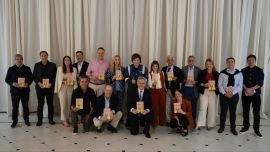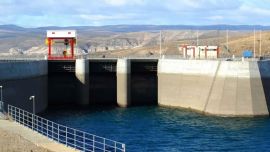Next weekend’s City race hogs the electoral limelight but there is voting even closer in time – like tomorrow when four provinces will be advancing their midterms. This column could go into Security Minister Patricia Bullrich changing her party colours (from yellow to purple) for the sixth time in her career with such strategic timing or we could echo other pundits in describing how a relatively united City Peronism stands to exploit the field right of centre being split right down the middle (and then some) but instead we will be federal – even if the quartet voting tomorrow (Chaco, Jujuy, Salta and San Luis) totals just under four million inhabitants or nine percent of the country’s population, which is still more people than the Federal Capital.
The impact of these elections will be more symbolic than real. Thus, taking the first in alphabetical order, there is little more at stake in Chaco than whether Radical Governor Leandro Zdero will add one or two seats to his current seven among the 16 seats up for renewal tomorrow – hardly a game-changer for that northern province, never mind nationwide. Yet should his gains be zero or minimal, this would not say much for the added value from La Libertad Avanza joining his Chaco Puede front, a back-handed setback for President Javier Milei.
There will be 11 lists bidding for the 16 seats but the race is highly polarised between Zdero and his three-term Peronist predecessor Jorge Capitanich heading the Chaco Mererce list and defending half those seats – something the latter might find hard to do against the challenge of the Primero Chaco Peronist splinter headed by Atlanto Honcheruk who might pick up a seat. Since the 2023 gubernatorial election was relatively close (46 percent for Zdero as against 41 percent for Capitanich, despite the baggage of the Cecilia Strzyzowski murder), a tight race can be expected. The campaign thus far has centred on swapping corruption charges.
Even if Jujuy has less than three-quarters of Chaco’s population, it has more lists competing for more seats – 13 for a total of 24 representing an electorate of just under 600,000 voters. Fully three-quarters (18) of those 24 seats are held by a Radicalism which has politically dominated this north-western province throughout the last decade, thus basically placing them on the defensive. Unlike in this City, the biggest challenge to the local ruling party comes not from Peronism, which ran Jujuy for eight consecutive terms following the return of democracy in 1983, but La Libertad Avanza, which in 2023 won in both rounds, including 58 percent in the run-off.
Peronism, with the local party under the controversial trusteeship of the abrasive Aníbal Fernández, could hardly be more shattered – not only has Radical Governor Carlos Sadir, under the guidance of his two-term predecessor Gerardo Morales, co-opted the organised labour backbone of Peronism including the local CGT by the simple expedient of placing a trade unionist Adriano Morone at the top of his Jujuy Crece list but the party’s national senator Carolina Moises is at daggers drawn with Cristina Fernández de Kirchner, joining the Convicción Federal splinter in the Senate and running her own Somos Más list tomorrow while deputy Leila Chaher of La Cámpora will be the Frente Justicialista’s standard-bearer.
La Libertad Avanza is always going to have ambitions in the province of the Senate libertarian caucus chief Ezequiel Atauche. No less a person than Presidential Chief-of-Staff Karina Milei went to Jujuy last Thursday to beef up the campaign of Kevin Ballesty, hitherto backed only by ‘El Gordo’ Dan and his trolls – the libertarians are convinced that the Radicals have a few seats surplus to requirements although they will also have to contend with two splinter lists. Among the remaining seven lists, perhaps the main dark horse is the left, headed by Alejandro Vilca, one of just five Frente de Izquierda y de Trabajadores - Unidad (FIT) leftist deputies in the current national Congress, but on the decline.
Salta is the most important of these four provinces with more people than Chaco and San Luis put together and the only one with a seven-digit electorate, pioneering electronic voting as from 2009. There will be bicameral voting to elect 12 provincial senators and 30 deputies (the latter like this City) for whom 14 lists will be competing. The opinion polls show the Unidad de los Salteños, the multi-party alliance under Renewal Peronist Governor Gustavo Sáenz, to command anything between three out of every eight voters to fully half while La Libertad Avanza (which won both rounds here back in 2023) in alliance with the far right firebrand Alfredo Olmedo is just under 20 percent – the three traditional parties (Peronists, Radicals and PRO) have around six percent each with every strand except Sáenz having splinter lists. The only nationally known name is former energy and mining secretary Flavia Royón, running for the Frente Vamos Salta in the provincial capital, while many of the candidates are not even known locally amid a prevailing mood of apathy.
Last and perhaps not the least but the least populated is San Luis (which voted for Javier Milei in both rounds in 2023 like Jujuy and Salta) with little over half a million inhabitants. Unlike the highly nationalised City election here, this is a purely local tussle for power between current Governor Claudio Poggi and his four-term predecessor Alberto Rodríguez Saá (Frente Justicialista) with the latter’s brother, five-term governor Adolfo Rodríguez Saá, backing Poggi’s Ahora San Luis list. Given the prominent position of Bartolomé Abdala in the national Senate (second only to Vice-President Victoria Villarruel), the libertarians are also pitching in but not under the usual LLA label – their list has been baptised Viva la libertad carajo! (Karina Milei is reportedly uncomfortable with this list). Four provincial senators and 22 deputies are up for renewal with 13 lists in competition (including a rare explicitly middle-class party, Proyecto Clase Media).
While this column’s brief is limited to campaigns and elections in this country, it seems impossible not to comment on lightning striking twice in two G20 Commonwealth countries in less than a fortnight. In both Canada and Australia, the right had opinion poll leads of 20 percent or more against eroded incumbents, in both cases Donald Trump enthusiastically backed those options while levying massive tariffs against their countries and as a result, Mark Carney’s Liberals came within four seats of an overall majority in Canada while in Australia Labor premier Anthony Albanese more than doubled Peter Dutton’s Liberals – the opposition leaders lost their seats in both cases. A toxic Trump effect which Milei might bear in mind.



















Comments